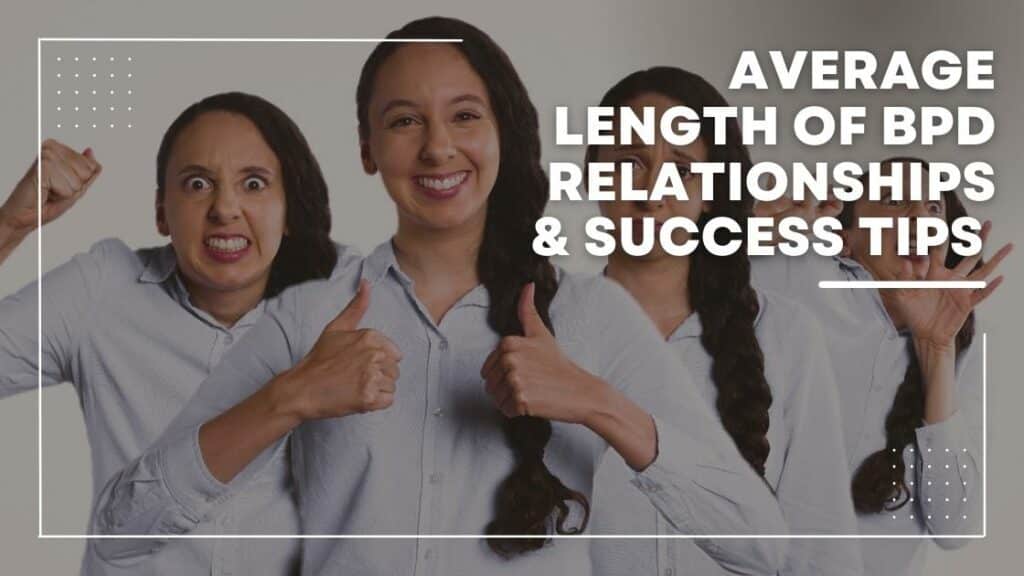When it comes to borderline personality disorder (BPD), there’s a lot of mystery and misunderstanding around the condition. This is especially true when it comes to relationships.
A relationship with someone with BPD is usually tumultuous and challenging for both parties.
These challenges can leave both parties wondering if the relationship will last. Which leads to the question, “what is the average length of BPD relationship?”
To answer this question, this article will discuss what borderline personality disorder is, the challenges of being in a relationship with someone with BPD, the BPD relationship cycle, and success tips when in a romantic relationship with someone with BPD.
Let’s get right into it.
Key Takeaways
- The average length of a borderline personality disorder relationship is 7.3 years, according to a recent study.
- There are several hurdles that threaten a BPD relationship which occurs in a cyclical nature.
- Couples who attend counseling and practice healthy communication are most likely to enjoy a successful BPD relationship.
What is Borderline Personality Disorder?
Borderline personality disorder is a mental illness characterized by instability in moods, behavior, self-image, and functioning.
People with BPD often have difficulty regulating their intense emotions and may experience intense anger, anxiety, depression, and impulsivity episodes.
They may also engage in risky or impulsive behaviors, such as reckless spending sprees, binge eating, substance abuse, and unsafe sex.
Additional borderline personality disorder symptoms may fear abandonment and feel isolated and alone. They also tend to view the world through a black-and-white lens, seeing people and situations as either good or bad with no middle ground.
The Challenges of Being in a Relationship With Someone with BPD
A relationship with someone with BPD is usually a push-and-pull type of relationship. It can be both rewarding and challenging.
On the one hand, you may find yourself drawn to their intensity, passion, and zest for life. On the other hand, you may also find yourself constantly walking on eggshells to avoid triggering their emotions.
It’s common for people with BPD to have difficulty maintaining a healthy relationship.
In fact, research has shown that people with BPD tend to exhibit lower satisfaction levels in relationships. There are several reasons that may contribute to this.
For one, people with BPD tend to be highly reactive and can quickly become defensive or angry when they feel threatened.
They may also have difficulty trusting their partner and may constantly fear abandonment.
Studies have also found that people with BPD tend to be sexually impulsive and may engage in risky sexual behaviors. This risky sexual behavior may put their relationships at risk. This impulsive behavior also makes people with BPD prone to cheating, further creating unstable relationships.
BPD Relationship Cycles
The BPD relationship cycle refers to the stages of a relationship when one partner has borderline personality disorder. The cycle typically has six stages, namely:
Stage 1: Attraction and Idealization
When the relationship is still fresh, the partner with BPD idealizes the other partner. They view their partner as the perfect person and are near obsessed with their partner.
Also called the honeymoon phase, this stage can have you thinking that your partner can do no wrong. The partner with BPD will put their partner on a pedestal and see them as almost perfect.
However, this is not an accurate or lasting view of the relationship and is usually not based on reality. This idealization can also be accompanied by “love bombing” and other extreme ways of showing attraction.
Stage 2: Insecurity and Fear of Abandonment
The second stage of a BPD relationship is characterized by insecurity, where the person with BPD convinces themselves that their partner doesn’t love them.
They may believe their partner will leave them and will do anything to prevent this from happening. The person with BPD may become clingy, needy, and possessive as they try to keep their partner close. This stage is usually accompanied by a lot of drama and can be very emotionally exhausting for both partners.
Stage 3: Withholding/ Withdrawing Affection
The third stage of a BPD relationship is characterized by the person with BPD withholding affection from their partner.
They’ll try to push away their partner using any means possible. The person with BPD may start arguments, withdraw emotionally, or give their partner the silent treatment as a way of testing if their partner loves them.
Stage 4: Escalating Conflict
At this relationship stage, the person with BPD believes their partner doesn’t love them. They’re sure that their partner is going to leave them. As a reaction, the partner with BPD escalates conflicts in the relationship.
They pick more arguments and may start gaslighting their partner or engaging in other manipulative behaviors.
They may even go as far as accusing their partner of monkey branching.
Stage 5: The Break-Up
Exhausted by the increased conflict, the partner without BPD starts to check out of the relationship.
They may start planning to leave or may already have one foot out the door.
The partner with BPD usually reacts to this by becoming even more clingy and needy. They may promise to change and even revert to how they acted on stage one of the relationship.
However, this doesn’t last, and the partner without BPD eventually leaves the relationship.

Stage 6: Regret, Guilt, and Depression
After the break-up, the partner with BPD usually regrets their actions and may feel guilty. They may also experience depression due to the loss of the relationship.
During this stage, the partner with BPD needs to seek professional help. A mental health professional can help them deal with their emotions.
Bonus Stage: Reconciliation
As mentioned, a BPD relationship is usually push and pull. Some couples break up and then get back together after some time. For these couples, the cycle starts all over again.
Related: Never Date Someone With BPD? 12 Reasons To Do It Anyway
So, What’s the Average Length of BPD Relationships?
According to a 2014 study, relationships with people with BPD typically lasted an average of 7.3 years.
However, this number isn’t definite. The study found that some couples broke up early in the relationship, while some had been in the relationship for over 20 years.
On most occasions, how long a relationship lasts depends on the people involved and how much effort they’re willing to put in to ensure the relationship’s success.
So, what type of effort should one put up to ensure the long-term success of a BPD relationship? We answer that in the next section.

Success Tips For When You’re In a Relationship With Someone With BPD
#1. Seek Out Information About BPD
One of the first ways to deal with the challenges of having a BPD partner is to gain an understanding of the condition.
You can read books and articles or talk to mental health professionals to better understand BPD. The more knowledge you have about the condition, the more patient you’ll be when dealing with your partner’s behaviors.
It’s also important to remember that people with BPD didn’t choose to have the disorder. It’s essential to be sensitive to this fact and not to blame your partner for their condition.
Related: Emotional Reactivity – 5 Ways To Be More Mature
#2. Attend Couples Counselling Together
Couples counseling is a great way to deal with the challenges of having a BPD partner.
A therapist can help you and your partner communicate better, understand each other’s needs, and develop coping strategies for when things get tough.
If you’re unsure if couples counseling is right for you, consider attending individual therapy first. This will give you a chance to work on yourself and address any issues that may be affecting your relationship.

#3. Practice Healthy Communication
Healthy communication is crucial for any relationship, but it’s especially important when you’re in a relationship with someone with BPD.
Make sure to communicate openly and honestly with your partner. Avoid using phrases like “You always” or “You never,” as these can make your partner feel attacked.
It’s also important to be aware of your tone when communicating with your partner. If you’re angry or frustrated, it’s best to step away from the conversation and return when you’re both calm.
Healthy communication takes practice, but having a strong and healthy relationship is worth it.
#4. Support and Encourage Your Partner To Seek BPD Treatment
If your partner is dealing with BPD, it’s essential to encourage them to seek treatment.
Treatment for BPD can include individual talk therapy, group therapy, medication, and hospitalization.
The most important thing you can do is support your partner as they go through treatment. This includes being patient and understanding that there may be setbacks and continuing to communicate openly and honestly.
#5. Be Mindful of Your Preconceptions
When you’re in a relationship with someone with BPD, it’s essential to be mindful of your preconceptions.
Just because your partner has BPD doesn’t mean they’re unpredictable or dangerous. It’s important to remember that people with BPD are individuals just like everyone else.
Rather than thinking of your partner as their diagnosis, try to think of them as a person with unique needs and challenges. This will help you to be more understanding and patient when things get tough.
#6. Talk Only When Your Partner is Calm
When your partner is in the middle of a BPD episode, it’s best to wait until they’re calm before you try to talk to them.
Arguing with someone in the midst of a BPD episode will only worsen the situation. If you need to, step away and return when your partner is calmer.
It’s also essential to avoid trying to fix your partner’s problems during an episode, as this can be frustrating for both of you and will only make the situation worse.

#7. Be Patient and Compassionate
When you’re in a relationship with someone with BPD, you must be patient and compassionate.
Your partner didn’t choose to have the disorder, and they’re likely doing the best they can.
Remember that there will be good days and bad days, and try to be understanding when things get tough. With patience and compassion, you can weather any storm.
#8. Be Compassionate But Don’t Take on Their Problems as Your Own
When you’re in a relationship with someone with BPD, it’s essential to be compassionate but don’t take on their problems as your own.
Your partner is already dealing with enough without you adding to their stress.
Make sure to take care of yourself and set boundaries, so you don’t get overwhelmed. It’s also essential to ensure you’re still meeting your needs.
If you feel overwhelmed, it’s best to talk to your partner about it and see if there’s anything they can do to help.
Related: 20 Ways Saying No To Someone With Borderline Personality Disorder
#9. Avoid Labelling and Blaming
When you’re in a relationship with someone with BPD, it’s important to avoid labeling and blaming.
A BPD sufferer already deals with enough stigma and don’t need you adding to it.
Rather than labeling your partner as “crazy” or “psycho,” remain calm and try to understand where they’re coming from and why they feel that way.
Blaming your partner for their BPD behaviors will only make the situation worse. Rather than placing blame, try to focus on understanding and support.
#10. Take Threats Seriously
When you’re in a relationship with someone with BPD, it’s essential to take any threats seriously.
Threats of self-harm or suicide should always be taken seriously and treated as medical emergencies.
Call your spouse’s therapist, doctor, or the National Suicide Prevention Hotline in case of threats. If you are ever in immediate danger, call 911.
Taking threats seriously can help keep your partner safe and get them the help they need.
#11. Prioritize Self Care
When you’re in a relationship with someone with BPD, it’s important to prioritize self-care.
Caring for someone with BPD can be taxing, and it’s essential to ensure that you’re taking care of yourself physically and emotionally.
Make sure to schedule time for yourself, do things that make you happy, and reach out to your support system if necessary.
By prioritizing self-care, you can avoid burnout and be there for your partner when they need you.

Average Length of BPD Relationship: FAQs
Why Do BPD Relationships Fail?
There are many factors that can contribute to the failure of a BPD relationship. One of the most common reasons is BPD’s intense mood swings and impulsive behaviors.
This can make it extremely difficult for both partners to communicate and connect deeper. Additionally, BPD relationships often involve high levels of conflict, which can be exhausting for both partners.
Another reason why BPD relationships may fail is that people with BPD often have difficulty trusting their partners. This can lead to jealousy and possessiveness, which can be toxic to a relationship.
Finally, BPD relationships are often characterized by a cycle of idealization and devaluation. This means that one minute your partner may see you as perfect, and the next, they may think you’re the worst thing that’s ever happened to them.
Can People With BPD Have Lasting Relationships?
Yes, people with BPD can have lasting and fulfilling relationships. However, it’s essential to be aware of the challenges of being in a relationship with someone with BPD.
One of the most important things you can do is to educate yourself about the disorder and its symptoms. This will help you to understand your partner and their behaviors better.
It’s also important to be patient, set boundaries, and take care of yourself. Doing these things can create a lasting and supportive relationship with someone with BPD.
How to Tell If Someone With BPD Loves You.
There are a few signs that you can look for to see if someone with BPD loves you.
One of the most common is that they will often idealize you and put you on a pedestal.
This means that they will see you as perfect and may even put you above all else in their life. Additionally, people with BPD are often very clingy and dependent on their partners.
They may also fear abandonment, which can lead them to behave in ways that seem possessive or jealous.
People with BPD will often swing between extremes regarding their emotions. One minute they may be madly in love with you, and the next, they may be entirely disgusted by you.
While these behaviors can be challenging, it’s important to remember that they are often a result of the disorder and not personal attacks.
Do Those Suffering From BPD Regret Breaking Up?
Many BPD sufferers do regret breaking up with their partners.
This is because people with BPD often have a extreme fear of abandonment, and a relationship ending up can trigger this intense fear.
As such, it can result in angry outbursts and they may have a hard time recovering.
Additionally, people with BPD may idealize their partners and see them as perfect.
When the relationship ends, they may feel like they’ve lost something perfect and may regret their decision to break up.
Finally, people with BPD often swing between extremes when it comes to their emotions. This can mean that they may regret breaking up with you one minute and be glad that they did the next.
If someone with BPD has broken up with you, giving yourself time to heal is essential.
It’s also important to remember that the decision to break up was likely not personal and that it’s not your fault.
Any Further Questions?
There you go.
An answer to the question, “what is the average length of BPD relationships?” I hope this article helped give you a better understanding of the dynamics of borderline personality disorder relationships.
